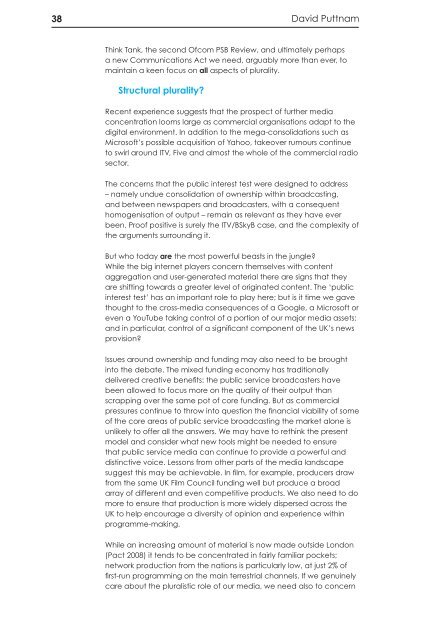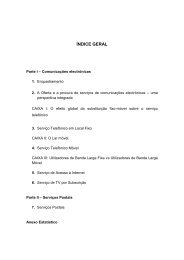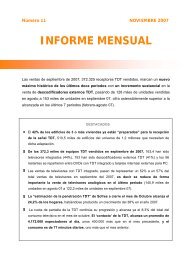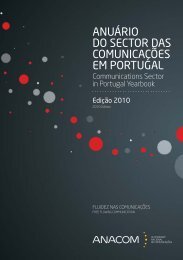The Price of Plurality - Stakeholders - Ofcom
The Price of Plurality - Stakeholders - Ofcom
The Price of Plurality - Stakeholders - Ofcom
Create successful ePaper yourself
Turn your PDF publications into a flip-book with our unique Google optimized e-Paper software.
38David PuttnamThink Tank, the second <strong>Ofcom</strong> PSB Review, and ultimately perhapsa new Communications Act we need, arguably more than ever, tomaintain a keen focus on all aspects <strong>of</strong> plurality.Structural plurality?Recent experience suggests that the prospect <strong>of</strong> further mediaconcentration looms large as commercial organisations adapt to thedigital environment. In addition to the mega-consolidations such asMicros<strong>of</strong>t’s possible acquisition <strong>of</strong> Yahoo, takeover rumours continueto swirl around ITV, Five and almost the whole <strong>of</strong> the commercial radiosector.<strong>The</strong> concerns that the public interest test were designed to address– namely undue consolidation <strong>of</strong> ownership within broadcasting,and between newspapers and broadcasters, with a consequenthomogenisation <strong>of</strong> output – remain as relevant as they have everbeen. Pro<strong>of</strong> positive is surely the ITV/BSkyB case, and the complexity <strong>of</strong>the arguments surrounding it.But who today are the most powerful beasts in the jungle?While the big internet players concern themselves with contentaggregation and user-generated material there are signs that theyare shifting towards a greater level <strong>of</strong> originated content. <strong>The</strong> ‘publicinterest test’ has an important role to play here; but is it time we gavethought to the cross-media consequences <strong>of</strong> a Google, a Micros<strong>of</strong>t oreven a YouTube taking control <strong>of</strong> a portion <strong>of</strong> our major media assets;and in particular, control <strong>of</strong> a signifi cant component <strong>of</strong> the UK’s newsprovision?Issues around ownership and funding may also need to be broughtinto the debate. <strong>The</strong> mixed funding economy has traditionallydelivered creative benefi ts: the public service broadcasters havebeen allowed to focus more on the quality <strong>of</strong> their output thanscrapping over the same pot <strong>of</strong> core funding. But as commercialpressures continue to throw into question the fi nancial viability <strong>of</strong> some<strong>of</strong> the core areas <strong>of</strong> public service broadcasting the market alone isunlikely to <strong>of</strong>fer all the answers. We may have to rethink the presentmodel and consider what new tools might be needed to ensurethat public service media can continue to provide a powerful anddistinctive voice. Lessons from other parts <strong>of</strong> the media landscapesuggest this may be achievable. In fi lm, for example, producers drawfrom the same UK Film Council funding well but produce a broadarray <strong>of</strong> different and even competitive products. We also need to domore to ensure that production is more widely dispersed across theUK to help encourage a diversity <strong>of</strong> opinion and experience withinprogramme-making.While an increasing amount <strong>of</strong> material is now made outside London(Pact 2008) it tends to be concentrated in fairly familiar pockets;network production from the nations is particularly low, at just 2% <strong>of</strong>fi rst-run programming on the main terrestrial channels. If we genuinelycare about the pluralistic role <strong>of</strong> our media, we need also to concern







